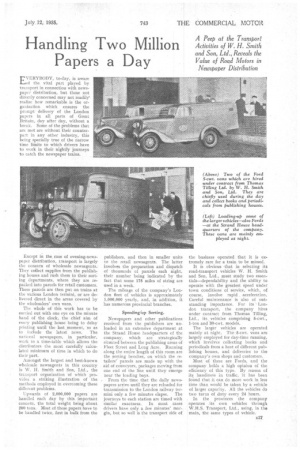Handling Two Million Papers a Day
Page 41

If you've noticed an error in this article please click here to report it so we can fix it.
A Peep at the Transport Activities of W. H. Smith and Son, Ltd., Reveals the Value of Road Motors in
Newspaper Distribution
EVERYBODY, to-day, is aware .1....dof the vital part played by transport in connection with newspaper distribution, but thcise not directly concerned may not readily' realize how remarkable is the organization which ensures the prompt delivery of the London papers in all parts of Great Britain, day after day, without a break. Some of the problems that are met are without their counterpart in any other industry, this being specialty true of the narrow time litnits to which drivers have to work in their nightlY journeys to catch the newspaper trains.
Except in the case of evening-newspaper distribution, transport is largely the concern of wholesale newsagents: They collect supplies from the publishing houses and rush them to their sorting departments, where they are repacked into parcels for retail customers. These parcels are then put on trains at the various London termini, or are delivered direct in the areas covered by the wholesalers' own vans.
The whole of this work has to be carried out with one eye on the minute hand of the clock, the chief aim of every publishing house being to delay printing until the last moment, "so as to include the latest news, The national newspapers, in particular, work to a time-table which allows the distributors • the most carefully calculated minimum of time in which to do their part.
Amongst the largest and best-known wholesale newsagents in this country is W. N. Smith and Son, Ltd., the transport organization of which provides a striking illustration of the methods employed in oVercoming these different problems.
Upwards of 2,000,000 papers are handled each day by this important concern, the total weight being about 200 tons. Most of these papers have to be handled twice, first in bulk from the publishers, and then in smaller units to the retail newsagents. The latter involves the preparation and dispatch of• thousands of parcels each night, their number being indicated by the fact that some 175 miles of string are used in a week.
The mileage of the company's London fleet of vehicles is approximately 1.000,000 yearly, and, in addition, it has numerous provincial branches.
Speedineup Sorting.
Newspapers and other pUblications received from the publishers are unloaded in an extensive department at the Strand house headquarters of the company, which are strategically situated between the publishing areas of Fleet Street and Long Acre. Running along the entire length of this room,are the sorting benches, on which the retailers'' parcels are made up with the aid of conveyors, packages moving from one end of the line until they emerge near the loading hays, From the time that the daily newspapers arrive until they are reloaded for transmission to the London railway termini only a few minutes elapse. The journeys to each station are timed with similar exactness. In most cases drivers have only a few minutes margin, but so well is the transport side of the business operated that it is extremely rare for a train to be missed.
It is obvious • that in selecting its road-transport vehicles W. H. Smith and Son, Ltd., must study two essentials—dependability and the ability to operate with the greatest Speed under town conditions of service, which, of course, involve rapid acceleration. Careful maintenance is also of outstanding impoviance. For its London transport, the company hires under contract from Thomas Tilling, Ltd., its„vehicles comprising 5-cwt., 1-ton and 30-cwt. models.
The larger vehicles are operated mainly at night. The .'S-cwt. vans are largely employed for day-time running, which involves collecting books and periodicals from a host of different publishing houses, and deliveries to the company's own shops and customers.
Most of these are Fords, and the company holds a high opinion of the efficiency of this type. By reason of its handiness in traffic, it has been found that it can do more work in less time than, would be taken by a vehicle of larger capacity. All the vehicles do two turns of duty every 24 hours, In the provinces the company operates . its own vehicles through W.H.S. Transport, Ltd., using, in the main, the same types of vehicle.




























































































